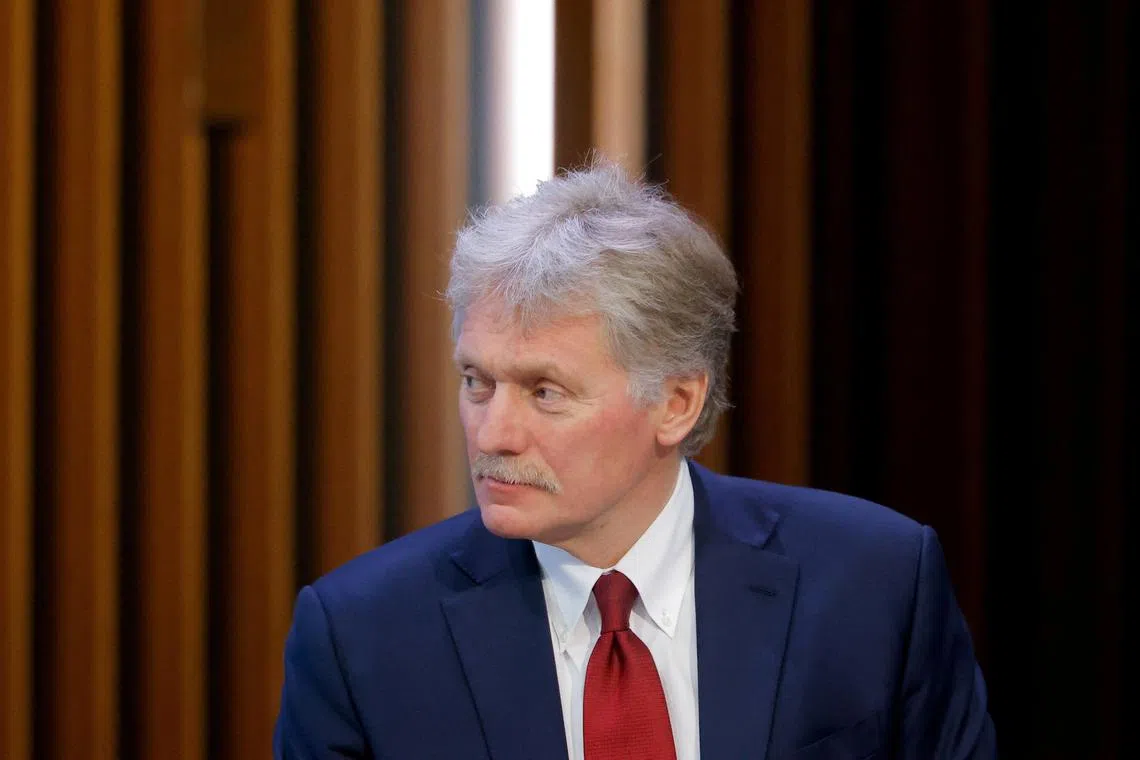A wary Russia waits for details from US on Ukraine ceasefire plan
Sign up now: Get ST's newsletters delivered to your inbox

Kremlin spokesman Dmitry Peskov told reporters Russia was waiting for a briefing from Washington.
PHOTO: REUTERS
MOSCOW – The Kremlin said on March 12 that it was awaiting details from Washington about a proposal for a 30-day ceasefire in Ukraine, while senior Moscow sources said a deal would have to take account of Russia’s advances and address its concerns.
After Russian forces advanced in 2024, US President Donald Trump reversed US policy on the war, launching bilateral talks with Moscow and suspending military aid and intelligence sharing with Ukraine, saying it must agree to terms to end the conflict.
The US agreed on March 11 to resume military aid and intelligence sharing after Kyiv said it was ready to support a ceasefire proposal
The Kremlin said it was carefully studying the results of the meeting and would await details from US Secretary of State Marco Rubio and White House National Security Adviser Mike Waltz.
Kremlin spokesman Dmitry Peskov suggested a reporter was getting “a little ahead” of himself by asking if Russia intends to tie a ceasefire proposal to the lifting of international sanctions imposed over the war in Ukraine.
Mr Peskov said: “Rubio and Waltz said that they would pass on detailed information to us through various channels about the essence of the conversation that took place in Jeddah. First, we must receive this information.”
Mr Rubio said the US was hoping for a positive response, and that if the answer was “no” then it would tell Washington a lot about the Kremlin’s true intentions.
He said there would be contacts with Moscow on March 12, that Europe would have to be involved in any security guarantee for Ukraine and the sanctions Europe has imposed would also be on the table.
Russia’s 2022 invasion of Ukraine has left hundreds of thousands dead and injured, displaced millions, and triggered the biggest confrontation between Moscow and the West since the 1962 Cuban Missile Crisis.
President Vladimir Putin has repeatedly said he is ready to talk about an end to the war and Mr Trump says he thinks the Russian leader wants to end the war, though other Western leaders say they do not believe Mr Putin.
Mr Trump said on March 11 that he hoped Russia would agree to a ceasefire and that he would talk to Mr Putin this week.
Reuters reported in November 2024 that Mr Putin was ready to negotiate a deal with Mr Trump
Ceasefire ‘trap’?
A senior Russian source told Reuters earlier that Moscow would need to hash out the terms of any ceasefire and get some sort of guarantees.
“It is difficult for Putin to agree to this in its current form,” the source, who spoke on condition of anonymity due to the sensitivity of the situation, told Reuters. “Putin has a strong position because Russia is advancing.”
The source said that without guarantees alongside a ceasefire, Russia’s position could swiftly become weaker and that Russia could then be blamed by the West for failing to end the war.
“So yes, we are in favour of a truce with both hands, but we need at least framework guarantees and at least from the United States,” the source said.
Another senior Russian source said the ceasefire proposal looked from Moscow’s perspective to be a trap because Mr Putin would find it hard to halt the war without some concrete guarantees or pledges.
A third Russian source said the big picture was that the US had agreed to resume military aid and intelligence sharing, and had decorated that move with a ceasefire proposal.
Mr Konstantin Kosachev, chairman of the international affairs committee of the Federation Council, the Upper House of Russia’s Parliament, said on the Telegram messaging app that Russia’s advances in Ukraine must be taken into account.
“Any agreements – with all the understanding of the need for compromise – on our terms, not on American. And this is not boasting, but understanding that real agreements are still being written there, at the front. Which they should understand in Washington, too,” he said.
Mr Putin has repeatedly said that a short-term truce is not the way to end the war.
“We don’t need a truce, we need a long-term peace secured by guarantees for the Russian Federation and its citizens. It is a difficult question how to ensure these guarantees,” he said in December 2024.
In June 2024, he had set out his terms for peace
Russia controls just under a fifth of Ukraine, about 113,000 sq km, while Ukraine controls a shrinking sliver of western Russia
Russia controls 75 per cent of Donetsk, Zaporizhzhia and Kherson regions and more than 99 per cent of Luhansk region, according to Russian estimates.
Russia says all of those four regions are now legally part of Russia and will never be returned to Ukraine, which says they have been illegally annexed and that it will never recognise Russian sovereignty over them.
The conflict in eastern Ukraine began in 2014 after a Russia-friendly president was toppled in Ukraine’s Maidan Revolution and Russia annexed Crimea, with Russian-backed separatist forces fighting Ukraine’s armed forces. REUTERS


